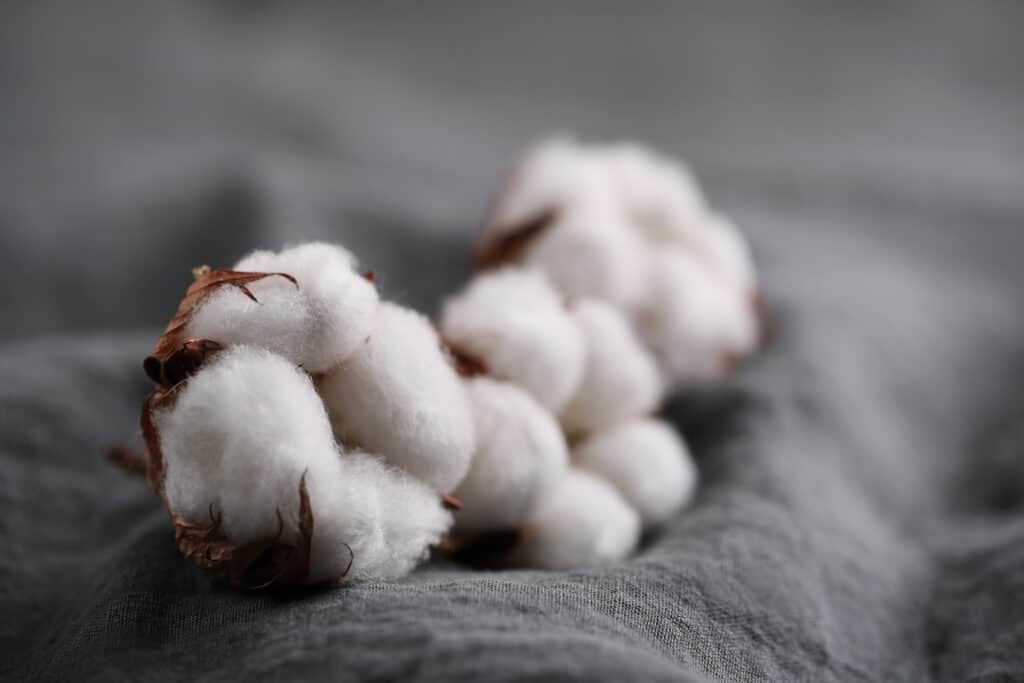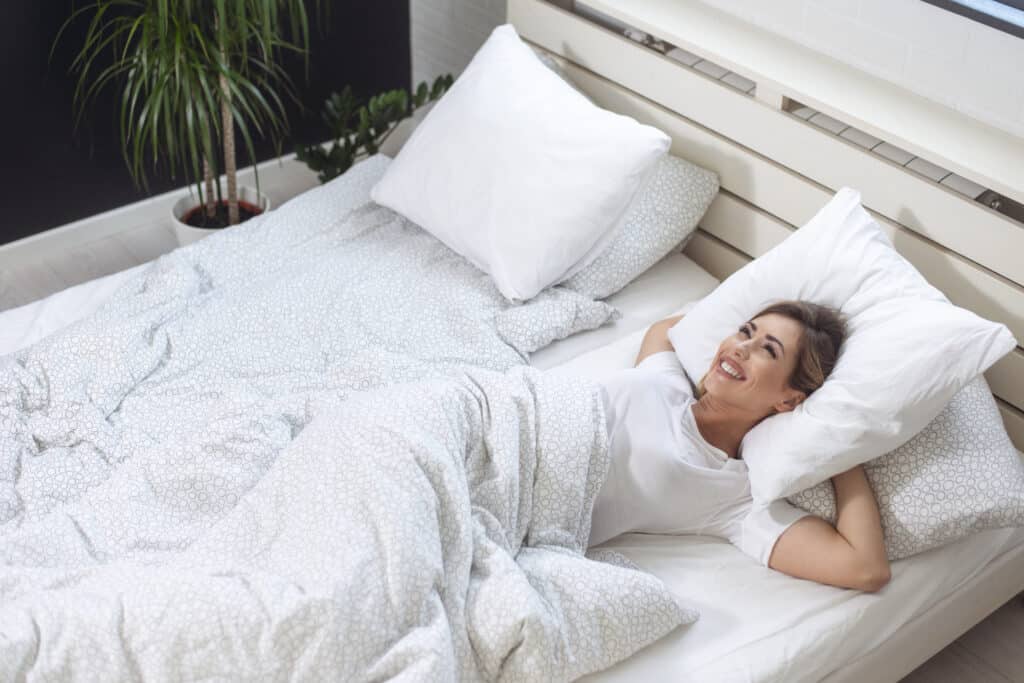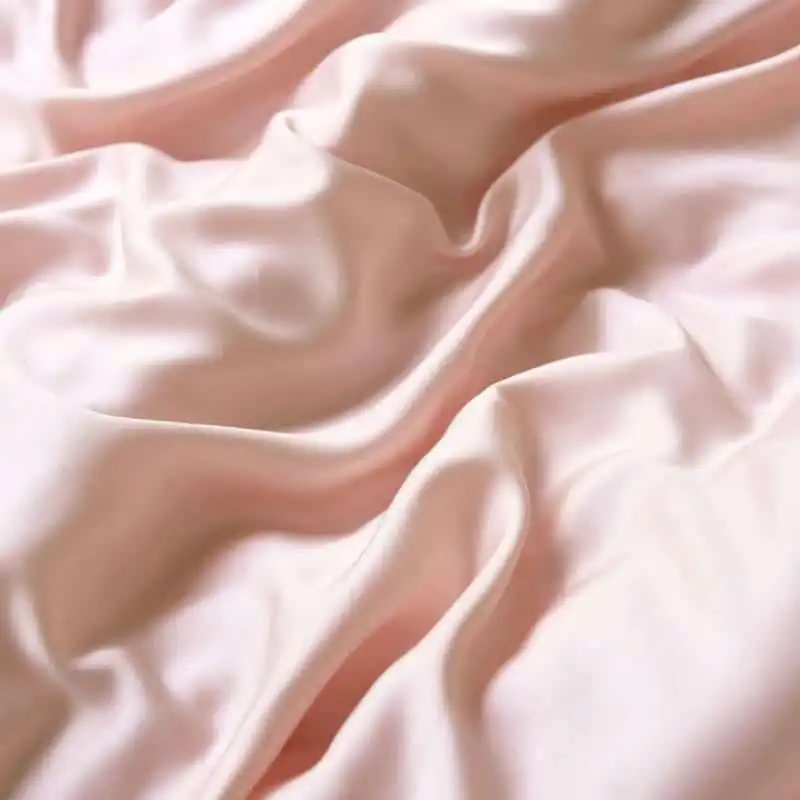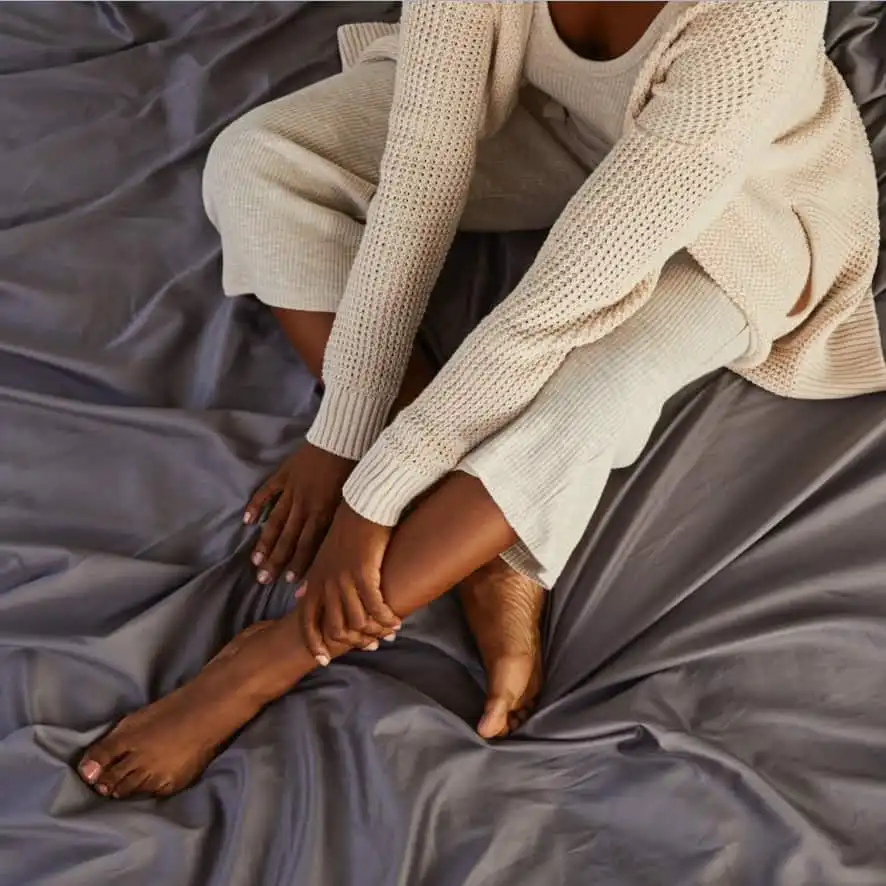- You are here:
- Home »
- Organic Bedding »
- Which Is Better: Bamboo vs Cotton Sheets
Which is Better: Bamboo vs. Cotton Sheets?
If you’re in the market for a new set of sheets, you might wonder whether bamboo or cotton is the better choice. Both materials have pros and cons, so deciding which is best for you can be tricky. In this post, we’ll look at both materials and help you decide which is right for you.
What Are Bamboo Sheets?
Bamboo sheets are made from the fibers of bamboo grass. They’re made by crushing the bamboo grass and then spinning it into thread. The thread is then woven into fabric. There are four different types of bamboo fabrics:
- Viscose bamboo: This is the most common type of bamboo fabric. It’s made by breaking down the bamboo pulp with a chemical process. This type of fabric is very soft and has a silky feel. However, it’s not as durable as other types of bamboo fabric and is more likely to shrink in the wash.
- Linen bamboo: This type of fabric is made from 100% bamboo fibers. It’s very strong and durable, making it a good choice for sheets. However, it can be pretty expensive.
- Bamboo/cotton blend: As the name suggests, this type of fabric is made from a mix of bamboo and cotton fibers. This makes it more durable than pure bamboo fabric but not as strong as linen bamboo.
- Bamboo lyocell: Bamboo lyocell is made from pure organic bamboo pulp, the bamboo is crushed, washed, and spun into yarns. Lyocell is almost always made from wood, but bamboo lyocell is a sustainable plant source. Bamboo lyocell sheets are soft and smooth, with a silk-like feel. They are also more absorbent than cotton, making them ideal for hot sleepers.

What Are Cotton Sheets?
Cotton sheets are made from the fibers of the cotton plant. The cotton plant is a shrub that produces fluffy white seeds. The seeds are surrounded by a thin layer of fiber. This fiber is what’s used to make cotton sheets. There are many types of cotton fabric used in sheets:
- Suvin, Pima, and Supima cotton: This type of cotton is made from the longest and strongest cotton fibers. It’s a high-quality fabric that’s very soft and durable.
- Egyptian cotton: Egyptian cotton is made from long, thin fibers, which make it very soft and silky. However, just like Pima and Supima cotton, it’s also quite expensive.
- Percale cotton: This type of cotton is made from long fibers tightly woven together. This makes it very strong and durable but also quite crisp.
- Flannel cotton: This type of cotton is made from shorter fibers that are brushed to create a soft, fuzzy surface. It’s often used for winter sheets as it’s very warm.
- Jersey cotton: Jersey cotton is a knit fabric made from cotton. It’s very soft and stretchy, making it comfortable to sleep in.
- Organic cotton: Organic cotton is made from cotton that’s grown without the use of pesticides or other harmful chemicals. All of the sheets mentioned above can be made of organic cotton. We always recommend it over conventional cotton because it’s better for your health and the environment.

The Pros and Cons of Bamboo Sheets
In this section, we’ll take a look at the pros and cons of bamboo sheets so you can make an informed decision about whether they’re right for you.
Pros:
- Bamboo sheets are soft and silky to the touch, you may not experience this level of softness with regular cotton sheets.
- Bamboo sheets are naturally breathable, meaning they won’t make you sweat as some synthetic materials can. They’re a great choice if you’re looking for cooling sheets.
- They’re hypoallergenic, so they’re a good choice for people with allergies or sensitive skin.
- Bamboo sheets are environmentally friendly. The bamboo plant is a renewable resource, so it doesn’t strain the environment like cotton production.
- They’re more absorbent than cotton, making them ideal for people who sweat at night.
- Bamboo sheets can be very durable, as long as you follow the care instructions.
Cons:
- Bamboo sheets can be more expensive than cotton sheets but they’re usually worth the investment thanks to their durability.
- They may not be as easy to find as cotton sheets because they’re still a relatively new product.
- Some types of bamboo fabrics can be toxic. Avoid bamboo viscose and bamboo modal as these two types of bamboo fabric use toxic chemicals during manufacturing. Look for bamboo lyocell or bamboo linen instead. These two types of bamboo are environmentally friendly and don’t use any toxic chemicals during production.
- Washing bamboo sheets can be tricky. You should always wash them on a delicate cycle in cool water and avoid using fabric softener or dryer sheets as these can damage the material.
Read More: Bamboo vs Eucalyptus Sheets
The Pros and Cons of Cotton Sheets
Now that we’ve looked at the pros and cons of bamboo sheets, let’s take a look at the pros and cons of cotton sheets.
Pros:
- High thread count, quality cotton is durable, so these cotton sheets are built to last. However, if you buy cheap cotton sheets, they may not last as long.
- Cotton is biodegradable, so it’s a more sustainable choice than some other fabrics.
- Organic cotton production is gentle on the environment since it doesn’t require pesticides or other chemicals.
- Cotton sheets are usually less expensive than bamboo sheets.
- They’re widely available, so you shouldn’t have any trouble finding them.
- Cotton sheets are hypoallergenic, making them a good choice for people with allergies.
Cons:
- Cotton sheets may feel stiff initially and take a few washes to soften up.
- They may also feel rough on your skin, especially if you buy low-quality fabric.
- They’re also not as absorbent as bamboo sheets, so they may not be ideal for people who sweat at night.
- They may retain heat, making them too hot to sleep on for some people. You can find high-quality, high-thread count cotton sheets that sleep cool, but they may be more expensive.
- Cotton may shrink when it’s washed in hot water, so you’ll need to be careful when laundering your sheets.
- Cotton may require more chemicals than bamboo during the farming process. It means they may contain toxic chemicals that can be harmful to your health. However, if you buy organic cotton sheets, this won’t be a concern.

So, Which Is Better?
The answer to this question depends on your needs and preferences. Bamboo sheets are the way to go if you want soft and silky sheets. However, if you’re looking for more durable sheets, then cotton sheets might be a better choice. Both of these sheets are very good at temperature regulation, so you’ll stay cool in the summer and warm in the winter.
However, bamboo sheets are generally more absorbent and breathable, so they may be a better choice for people who tend to sweat at night. Whichever type of sheet you choose, make sure to buy the best quality you can afford to get the most out of your purchase.
How to Choose the Right Type of Sheet for You?
When shopping for sheets, consider your budget, sleep habits, and any allergies you may have. Cotton sheets are a more affordable option if you have a limited budget. Bamboo or cotton sheets are both excellent choices if you sweat at night or have allergies.
However, if you’re looking for the most luxurious and silky feeling sheets, then bamboo is the way to go unless you want to spend more on high-end organic cotton sheets with long fibers.
Wash your new sheets before using them for the first time, no matter what type of sheet you choose. This will help remove any excess fabric finishes and ensure they’re soft and comfortable.
Read More: Microfiber vs Cotton Sheets
What Are the Best Bamboo Sheets?
When shopping for bamboo sheets, make sure they’re made from bamboo lyocell or bamboo linen. These types of bamboo are the most sustainable and environmentally friendly. Avoid sheets made from bamboo rayon, viscose, or modal, as these types of bamboo are less durable, more likely to pill, and they’re not a healthy choice as they’re mixed with synthetic chemicals.
The best bamboo sheets are those that are soft, silky, and durable. Look for sheets with a high thread count and those that have been pre-washed to avoid shrinkage. You should also make sure they’re OEKO-TEX certified, which means they’ve been tested for harmful chemicals.
We recommend Ettitude. Ettitude Bamboo Sheets are made from 100% bamboo lyocell, which is a sustainable and environmentally friendly fabric. The bamboo lyocell is hypoallergenic and Oekoe-Tex certified, meaning it’s free from harmful chemicals, making it ideal for sensitive skin.
These bamboo sheets are a silky-soft, sateen weave that is extremely comfortable to sleep on. They’re available in a variety of colors and patterns, and they are also available in twin, full, queen, and king sizes.
What Are the Best Cotton Sheets?
If you buy cotton sheets, ensure they’re top quality. Your best bet is Suvin cotton sheets, they’re known for being soft, durable, and luxurious because they’ve got long fibers. Avoid sheets made with conventional cotton as they’re more likely to contain harmful chemicals. Instead, look for organic cotton sheets that are GOTS-certified.
We recommend GOTS-certified Organic Suvin Sheets by Avocado. These sheets are made of silky-soft, long-lasting GOTS-certified organic Suvin sateen cotton to a lush 1000 thread count.
Avocado’s organic practices also mean that their products are gentle on the environment throughout the whole process – from farming and harvesting to manufacturing and shipping. You can rest easy knowing that Avocado’s sheets are incredibly soft, cloud-like, and earth-friendly.
Certificates: GOTS, Oeko-Tex, Made Safe, Vegan Approved
Materials: Organic Cotton
FAQs
What is the difference between bamboo and cotton sheets?
Bamboo sheets are made from the pulp of the bamboo plant, while cotton sheets are made from, you guessed it, cotton.
Bamboo is a type of grass that is very fast-growing, making it a more sustainable choice than cotton (unless you choose organic cotton sheets). High-thread count cotton sheets are softer and more breathable than bamboo sheets.
How to wash bamboo sheets?
Bamboo sheets can be machine washed on a gentle cycle with cold water. You can also hand wash them in cold water. Hang them to dry or machine dry on a low setting. Do not iron or bleach bamboo sheets.
How to wash cotton sheets?
Cotton sheets can be machine washed on a gentle cycle with warm water. You can also hand wash them in warm water. Tumble dry on low or line dry. Iron as needed. We don’t recommend bleaching as it weakens the fibers and can leave a toxic residue.
Are bamboo sheets toxic?
It depends on the manufacturing process. If the sheets are made with formaldehyde or other chemicals, then they could be toxic.
This could be the case, especially with viscose and rayon bamboo sheets. Be sure to choose bamboo linen sheets or bamboo lyocell sheets to be sure they are free of harmful chemicals.
Are cotton sheets toxic?
Sheets made from regular cotton may be treated with pesticides and other chemicals. Look for cotton sheets that are GOTS-certified organic to be sure they are free of harmful chemicals. Organic cotton sheets may be more expensive, but they are worth the investment for your health.
Bottom Line: Bamboo vs. Cotton Sheets
Both bamboo and cotton sheets have their own unique set of benefits and drawbacks. It really comes down to personal preference in the end.
If you want soft and breathable sheets, go for cotton. If you want durable and hypoallergenic sheets, go for bamboo. You may also consider other types of sheets, check our articles about hemp sheets and eucalyptus sheets to learn more.
About the Author Kamila Flieger
My name is Kamila, and I'm passionate about researching non-toxic, organic products for the home. I believe it's so important to create a safe and healthy environment for our families, and I enjoy helping others do the same.



